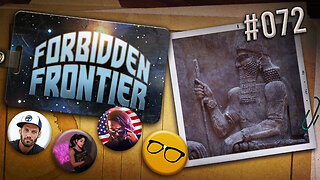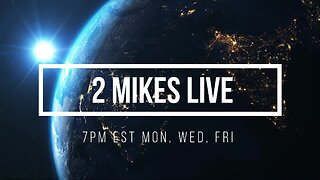Debunking 5 Criticisms and Misconceptions About the Bible | Prove Scripture’s Accuracy and Relevance
To learn more about The Bible get Your Free Book, "The Bible: Fact or Fiction?" https://bit.ly/3MlmpWG Why is this free? We are determined to follow Jesus’ command too "freely give" (Matthew 10:8).
The Bible is, beyond any doubt, the most influential book in human history. Today, it is dismissed by many as unreliable; filled with superstition and best not taken completely seriously. Yet, if this book truly is what it claims to be—the word of God—then there is no book on earth that you should take MORE seriously. Join me on this episode of Tomorrow’s World as we debunk five myths about the Bible.
Greetings, and welcome to Tomorrow’s World, where we help you make sense of your world through the pages of the Bible. Today, you and I are going to debunk five myths about God’s word, the Holy Bible, and demonstrate how they are little more than fantasies, wielded by those uncomfortable with what God has to say about the world—and about their lives.
Here’s our first one: That…
The Bible is historically unreliable.
Many claim that the Bible is filled with myths and made-up stories, but nothing could be further from the truth. Time and time again, when historians and the Bible conflict, the fight goes in the Bible’s favor.
For instance, many skeptical historians believed that the Hittites were a fictional kingdom of Old Testament stories—until they discovered the empire, exactly as the Bible described! In the 19th century the ENTIRE CAPITAL of the Hittite people was discovered, along with their royal archive containing thousands of ancient records related to their vast empire.
The critics mocked the Bible, until, in all their digging, real history mocked THEM and vindicated the Bible!
This is the pattern: Skeptics doubt the Bible and are proven wrong. We don’t have NEARLY enough time to list the countless ways that archaeology has shown the Bible to be trustworthy, but let’s look at a few.
Archaeological evidence for major individuals in the Bible continues to be found. Figures in the Old Testament, like King Hezekiah, King Ahaz, and the infamous Queen Jezebel—as well as figures in the New Testament, such as Pontius Pilate and High Priest Caiaphas—all show up in various artifacts or ancient records as historians continue to press into the past.
For some time, the Bible’s King David was widely considered a myth, like England’s King Arthur—until excavations uncovered an Aramaic stone inscription in the ancient city of Dan, referring to “the king of the house of David.”
One of my favorite discoveries is not of a famous person. In 2007 an archaeology professor from Vienna was examining a small, 25-century-old clay fragment from ancient Babylon—essentially, a receipt for a payment made to a sun-worship temple. In ancient cuneiform writing, it bore the name “Nebo-Sarsekim,” a chief of eunuchs. Well, who cares? Well, the same individual is mentioned in the same position in the biblical book of Jeremiah!
And think about it; this isn’t a “big name” person.
If the Bible were full of fiction, getting the names of FAMOUS people right might be easier to explain. But the names of the non-famous people? Getting them right, too, would be remarkable!
It’s never wise to bet against the Bible when it comes to history! Mock the Bible, and, eventually, the facts mock YOU.
So, let’s turn to our second myth. This myth claims that…
The text of the Bible has been dramatically changed over the centuries.
I have some sympathy for those who believe this without researching it. After all, the Bible is a collection of books, the most recent of which was written almost two thousand years ago—and the oldest of which was written thousands of years before that!
Given that were no digital hard drives or photocopiers, the words of the Bible had to be meticulously hand-copied from one document to another, century after century.
How could it be even remotely possible that the text was faithfully preserved?
Yet an unbiased look at the evidence shows that this is exactly what happened.
For instance, before the famous Dead Sea Scrolls were discovered in the late 1940s and early 1950s, the oldest copy of the Book of Isaiah dated back only so far as 1,000 AD. The discovery of scrolls containing the text of Isaiah among the Dead Sea Scrolls, including one nearly full copy of the book, pushed that date BACK a full THOUSAND YEARS or more, to the century before Christ. And the level of accuracy in transmission over those thousand-plus years was remarkable.
-
 28:30
28:30
Tomorrow's World - Rumble
1 day agoTomorrow's World: What Will It Be Like?
14 -
 3:04:49
3:04:49
The Dan Bongino Show
2 days agoFlagstock 2024 - Celebrating UNC's Patriots
540K441 -
 2:00:05
2:00:05
Nerdrotic
9 hours agoAnunnaki: Mythic Gods or Ancient Astronauts? | Forbidden Frontier #072
52.3K16 -
 2:28:26
2:28:26
WeAreChange
8 hours agoAndrew Tate and Jake Shields Drama Exposed!
66.4K84 -
 1:13:39
1:13:39
We Like Shooting
16 hours agoDouble Tap 373 (Gun Podcast)
38.5K4 -
 LIVE
LIVE
Tundra Gaming Live
8 hours agoThe Worlds Worst Horror Streamer Has Heart Attack Playing Resident Evil Village
1,106 watching -
 28:52
28:52
PISANITY
9 hours agoI Got Pulled Over on my Motorized Toilet (twice)
43.8K15 -
 1:06:12
1:06:12
Patriots With Grit
11 hours agoState Sanctioned Rape: Trans Supremacy In Women's Prisons | Amy Ichikawa
40K5 -
 1:39:38
1:39:38
2 MIKES LIVE
7 hours ago2 MIKES LIVE #111 Deep Dive Monday!
48.3K2 -
 14:37
14:37
Chrissy Clark
12 hours agoThe Media Is LYING About What’s Happening In Colorado… I Underreported Stories
56.3K39